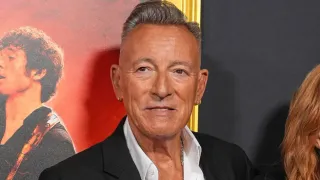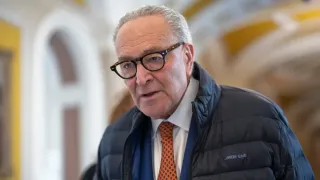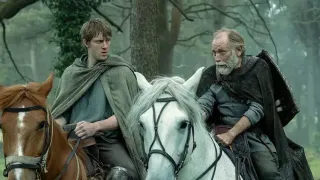June 3, 2017
Out There :: Frameline Frolics
Roberto Friedman READ TIME: 3 MIN.
There's a certain amount of buzz surrounding Frameline 41, the San Francisco International LGBTQ Film Festival coming up this June 15-25. Some of that advance excitement attends the opening-night attraction, "The Untold Tales of Armistead Maupin," a bio-pic of the beloved San Francisco author from director Jennifer Kroot and editor/co-director Bill Weber. But a lot of it results from other diverse entries in the film fest's full slate of offerings, the state of queer cinema represented by 147 films from 19 countries.
Last week's press conference at the Oasis nightclub South of Market doubled as a launch party, which meant that serious journalists were greatly outnumbered by blogger hobbyists and members of the general public, presumably present in recognition of their outsize love of film. Still we came away with plenty of dish. Here's a brief rundown of some of the highlights.
The opening doc centers on Maupin, the living author perhaps most closely associated with our little cowtown, and "shines a light on the enchantment of this place and its cast of characters," said Frameline executive director Frances Wallace. But the closing-night film, "After Louie," from first-time director Vincent Gagliostro, sounds equally enticing. The truly fabulous Alan Cumming stars as a gay man who has survived the plague years but not without scars, embarking on a romance with a younger man (Zachary Booth). The impressive cast of supporting players includes David Drake, Justin Vivian Bond, Wilson Cruz, and Joey Arias. Cumming, who Wallace said gives "the performance of a lifetime" in the film, will receive the 2017 Frameline Award at the closing-night screening, and deservedly so.
Director of exhibition and programming Des Buford pointed to the large number of trailblazers we meet in some of the festival's high-profile films, such powerhouse musical talents as iconic macha chanteuse Chavela Vargas ("Chavela"), Whitney Houston ("Whitney. 'Can I Be Me'), and former American Idol contestant Todrick Hall ("Behind the Curtain: Todrick Hall"). Other icons of gay culture explored in this year's offerings include transgender pioneer Marsha P. Johnson ("The Death and Life of Marsha P. Johnson"), producer Allan Carr ("The Fabulous Life of Allan Carr") and the immortal illustrator/cultural influencer Tom of Finland (doc of same name).
A series of screenings and panels, "Barriers & Breakthroughs: Illuminating Filmmakers of Color Before and Beyond 'Moonlight'" asks whether there's been a real change in representation post-Oscar win for "Moonlight." Part of that series, director Isaac Julien's classic "Looking for Langston [Hughes]" (1989) is one of several queer "golden oldies" getting screenings at the fest, including directors Harry Dodge and Silas Howard's "By Hook or By Crook" (2001) and director Donna Deitch's lesbian classic "Desert Hearts" (1985).
A new category, "Episodic," points to the new importance of serial and web-based content, and greatly bolsters the festival's minority representation, both in front of and behind the camera. The festival's tag-line, "Genre Queer," perhaps points to this new disruption of categories.
US-based features include director Trudie Styler's "Freak Show," based on club-kid/author James St. James' young adult novel, which offers a knockout cast including Bette Midler, Abigail Breslin, Laverne Cox and John McEnroe. Tony winner, San Francisco native Lena Hall ("Hedwig") stars as singer-songwriter "Becks" in directors Daniel Powell and Elizabeth Rohrbaugh's Centerpiece feature of the same name. Director Jennifer Reeder's "Signature Move" is set in Chicago's Pakistani community. On the edgy, evil front, it's hard to beat director Marc Meyers' "My Friend Dahmer," the portrait of budding sociopath Jeffrey Dahmer.
Senior programmer Peter L. Stein introduced the fest's World Cinema films, hailing from 17 countries and unfolding in 10 languages. Centerpiece film "Sueno en Otra Idioma" ("I Dream in Another Language"), from director Ernesto Contreras, takes place deep in the Veracruz rainforest. South African director John Trengove's "The Wound" concerns an indigenous tribe's manhood initiation rituals. Director Pouria Heidary Oureh's "Apricot Groves" concerns a transmasculine American who returns to Armenia to claim a traditional bride. It's that rare film that plays in Armenian and Persian dialects.
The number of feature documentaries comes to 26, including director Josh Howard's "The Lavender Scare," about the 1953 witch-hunt of gays in the federal government, and director Yony Leyser's "Queercore: How To Punk a Revolution," whose talking heads include Lynn Breedlove, Pansy Division, Tom Jennings, and many others. Shorts programs include such perennial favorites as "Fun in Boys Shorts," "Fun in Girls Shorts," and "Bi Candy," but also "Transtastic" and "Portraits of Resistance." As the Frameline programmers reminded us, short efforts often portend future features.
There's much more on offer, but all we can do at this point is urge you to find a Frameline 41 catalog or go online at frameline.org, and choose whatever rocks your own particular queer boat. Tickets go on sale to the general public on June 2.






